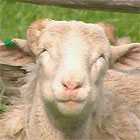Breed:
Wiltshire Poll Sheep Temperament:
docile Cost:
$200 (pet) $600 (breeding) Lifespan:
10 years Maintenance:
low Recommended for:
semi-rural settings
History:
The Wiltshire Poll (Wiltipoll) is a little out of the ordinary. Wiltshire’s are wool-shedding sheep; they will seasonally shed their fleece, requiring little to no shearing. The Wiltipoll is so named because it is a ‘poll’ variety of the Wiltshire horn sheep. A ‘polled’ variety, be it sheep, goat or cattle, is one that doesn’t grow horns. Hence, ‘Wiltipoll’. Wilthshire Horn are a British breed. The polled variety of the Wiltshire Horn was developed in Australia.
Appearance:
Wiltipolls are large sheep, weighing between 65-120 kilos, rams being at the heavier end of the scale. They are best described as having a ‘wedge’ shape, tapering towards the forequarters. There is no wool present on the head, belly or crutch (that area between the hind legs).
Benefits:
Most wool sheep grow a lot of wool around the crutch, including around the anus and with males, around the penis. These areas can become easily contaminated with faecal material and urine stains, which in turn attracts flies that will lay eggs on the skin. The eggs hatch, producing maggots, which then feed off the already stressed skin. This ‘fly strike’ can be very harmful to sheep, even causing sheep deaths and also large economic losses to the producers. Sheep that don’t have too much fleece in these susceptible areas are easier to maintain against fly strike; dags are limited and the susceptibility to fly strike is reduced.
For small hobby farmers, or those with a small plot who are just looking for an animal to keep the grass down, Wiltipolls are worth considering. They are cheap to maintain and won’t require a visit from the shearer, which can be difficult to arrange when you only have a couple of sheep.
Temperament:
Wiltipolls are very docile. Rams are usually the most dominant amongst sheep breeds, however the absence of horn also makes the Wiltipoll ram a little less aggressive. Breeders say that the sheep will feed out of your hands and don’t require dogs for herding.
Maintenance and cost:
These sheep are regarded as easy care and low maintenance. The wool sheds in spring, leaving a hairy undercoat over summer. Once the weather begins to cool in autumn, the wool begins to regrow in time for the cooler months. Lambs sell from about $200 for a pet to $600 for breeding stock.
Breeding:
Compared with other sheep, the Wiltipoll is a prolific breeder. Ewes will only breed once a year, but unlike many other sheep breeds, twins, triplets and even quadruplets are not uncommon.
Ideal owner:
The ‘easy care’ aspect of the breed makes it attractive to small land holders, hobbyists and those seeking a sheep for a pet or simply for grass control.
Further information
We filmed this segment near Geelong with Helen and Terry English. For more information check the website: www.sheep.com.au
For details of breeders in your state, contact The Australian Wiltipoll Association Inc.
Web: www.wiltipoll.com
Email: [email protected]



